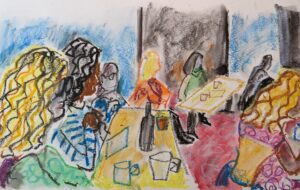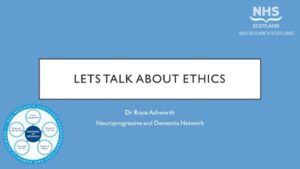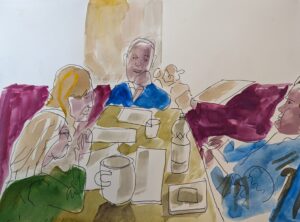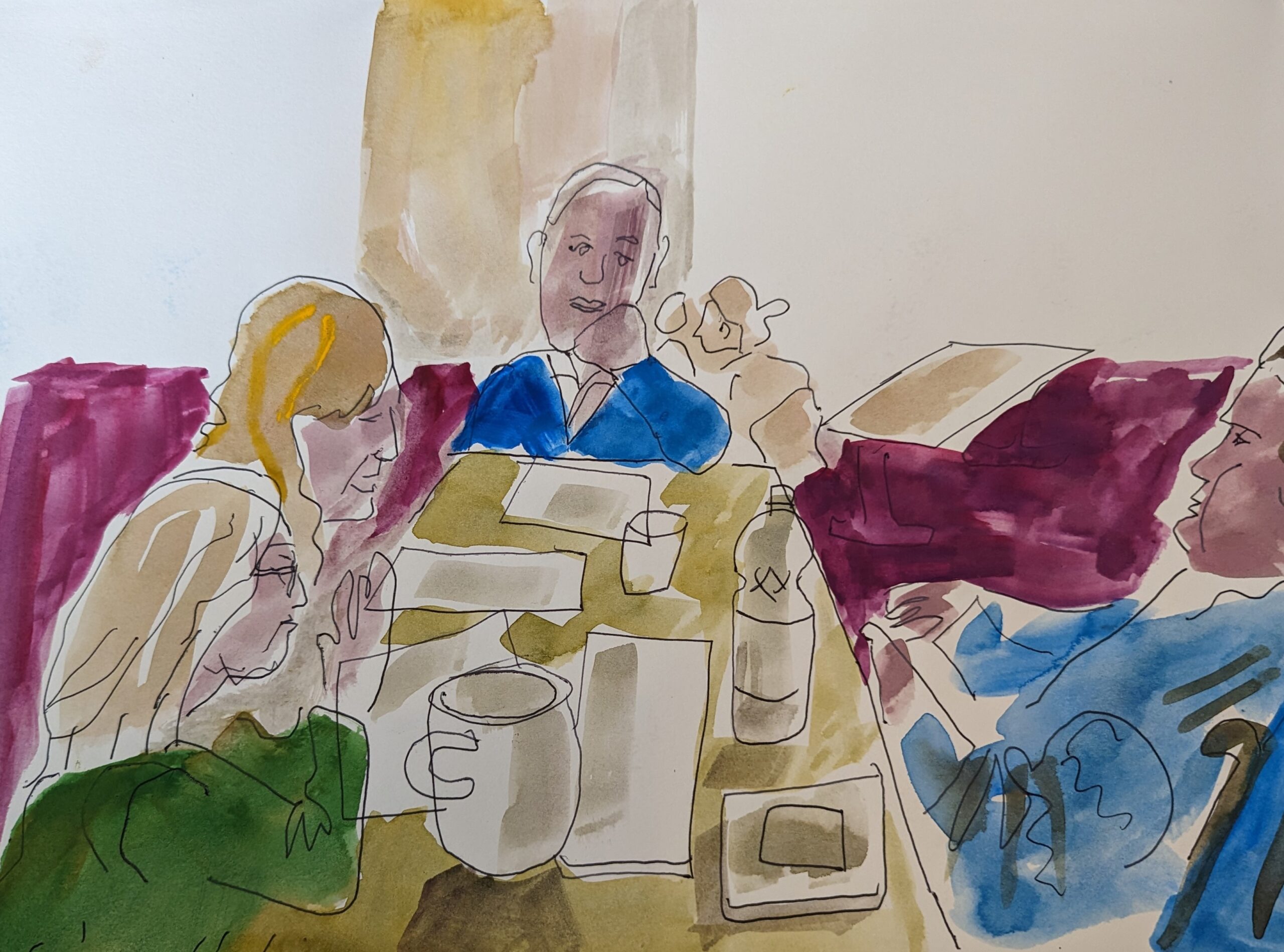
On Wednesday 24th May 2023, we held our first of a series of four workshops that explore how we can include people with a more advanced dementia as co-researchers through creative and arts-based methods.
The project is funded by the Royal Society of Edinburgh and led by Dr Frankie Greenwood at ECRED in collaboration with the BINKS hub. Our core project team also includes Dr Katey Warran (ECRED), Dawn Irvine (bold – Bringing out Leaders in Dementia), Dr Jimmy Turner (BINKS), Dr. Rosie Ashworth (Neuroprogressive and Dementia Network), Dr James McKillop (Lived Experience Researcher), Willy Gilder (Lived Experience Researcher).
The workshop was held at the Festival Theatre in Edinburgh, and it was wonderful to see people from so many different backgrounds joining us both online and in person to take part in these vital discussions. Willy Gilder sketched and painted his way through the day, and his wonderful artwork depicting the workshop is shown throughout this blog.
After some fun introductions from the project team, and those attending, Frankie introduced the background of the project. She referred to ECRED’s very own Professor Heather Wilkinson’s 2002 book, The Perspectives of People Living with Dementia, Research Methods and Motivations. Heather wrote that during the development of several research projects that included people with dementia as participants; she was often asked, “why bother, or is it possible?” Heather’s book focused on 3 key questions:
- Should we be including people with dementia in social research on dementia?
- Can we include them?
- What still needs to be done to facilitate work in this area?
The landscape of dementia research has shifted dramatically over the last 20 years. It has moved from a place where it was unheard of that people living with dementia would be included in dementia as active participants and their voice was rarely heard, to the present day, when dementia research does now include people living with dementia more often, not only as participants, but as co-researchers who identify the research priorities and direct the research process. We know that we still have some way to go to get this absolutely right, and we are constantly exploring ways to improve this process. We also know that there is little discussion about how people with a more advanced dementia, who may not be able to communicate using verbal language can contribute to research using traditional research methods and influence the direction of research in a way that is meaningful for them. People with a more advanced dementia are often seen as those who cannot make decisions and are rarely given the opportunity to express what is meaningful for them in terms of future research and policy decisions.
Frankie explained how we find ourselves asking the same questions that Heather posed in her 2002 book, but this time focusing on people with a more advanced dementia, who are unable to communicate in the traditional verbal language that we rely on to understand what is important to people.
- Should we be including people with a more advanced dementia in social research on dementia?
- Can we include them?
- What still needs to be done to facilitate work in this area?
We know that this isn’t an easy task, and we may end up with more questions than answers, but as James McKillop, said at one of our planning meetings, rather than “just not bothering” to include people, we should “just try harder”.
As with all proposed research, ethical issues need to be carefully considered, and developing collaborative research with people living with dementia can be ethically challenging. Academic research often excludes people with a more advanced dementia and the focus of this workshop was to explored these ethical dilemmas through asking this question:
“Can it be ethical to exclude people with a more advanced dementia as co-researchers?”

Dr Rosie Ashworth gave a very interesting and thought-provoking presentation on the ethics process when carrying out social research, explaining the ethics system within which we conduct social research, the difference between clinical and social research, what happens when you wish to include someone in research who may not be seen as having the capacity to give consent, and some of the legal issues in the ethics process.
Rosie then shared 3 ethics scenarios with us all. We split into different discussion groups and discussed the following questions:
- What might the ethical issues be for this piece of research?
- Why might we exclude people with a more advanced dementia in this research?
- What would make the research more inclusive and accessible?
- What would you want to see from an ethical researcher?

The rich and thought-provoking feedback from each group highlighted the ethical challenges and nuances that need to be considered when including people who may not be able to communicate using verbal language. Questions were raised that asked:
- Is there a way where research could be done without dehumanising anyone?
- Were people who were seeming unable to consent using the current rules seen an “un-people”?
- What a re-iteration of what consent is might mean?
- Could we consider progressive consent?
- Could we look for ways to understand consent that are non-verbal?
- There was a sense that traditional ethics committees did often not recognise the need for a more nuanced and inclusive approach to ethics, and there was a need to find another way.
After a break for lunch, Dawn Irvine led us in a stretch and revitalise exercise which set us up well for the afternoon session.

Rosie Ashworth talked about what co-research means and shared information on the Gold Standards of Ethics, a publication written by people living with dementia about aspects of ethics that they want to see in a research setting.
We then broke into small groups again to discuss the question:
“What could an ethics process that includes people with a more advanced dementia as co-researchers look like?”

More rich and interesting thoughts and ideas emerged including:
- Finding ways to fit research to people living with dementia rather than trying to fit people living with dementia into research project.
- Thinking of and using language that is more visual and not always verbal or textual.
- Being flexible in how to gain consent in non-verbal ways, being flexible in how to conduct research, thinking outside the box. Capacity means different things for different people.
- Understanding ethics as being emergent rather than an endpoint.
- Dislodging academic research from the top of the research hierarchy and dismantling the research hierarchy.
- Not always needing to carry out academic research that has to go through an Ethics Committee and getting it published. Rather, consider what we can learn from intrinsic and relational learning which can more easily include people with advanced dementia in process-based learning.
- Adapting the project through the course of the work rather than fixing it at the outset
- Being risk aware rather than risk averse.
- Taking time to build relationships with the people with a more advanced dementia before you do the research – a pre-ethics stage of research where you get to know the person with dementia and how they communicate.
- Taking TIME to develop the project to ensure involvement.
- Involving all people working (paid or not) in dementia in the research process. Reshaping the rules of engagement – is it event possible to get through the existing process with people who may not necessarily understand exactly what the whole process is?
- Can we at the very least find a way that means we do research that is meaningful to the person living with a more advanced dementia?
As we wrapped up the workshop, it became clear that the term “advanced dementia” could be interpreted in many different ways, and it was felt that we needed to define what we meant by this for the purpose of this project. We understood that this might change through the course of the project, but essentially, our purpose it to find ways to include people living with dementia who are unable to communicate using verbal language that is often used in traditional research methods.
It was energising and encouraging to be amongst such rich and thought-provoking discussions and share thoughts and ideas with people who are interested in finding ways to make our research processes more inclusive and meaningful for all people living with dementia. Running a hybrid event did not prove to be an easy task, and whilst we did our best to make this a fully inclusive experience there were some technical difficulties that did not make it the best experience for those of joining online. We really appreciate the patience and tenacity of those who joined online, and we are looking at ways in which that can be a better experience at the next workshop!
We are very much looking forward to our second workshop on Friday 30th June 2023, where we will be joined by Therapeutic Clown, Suzy Ferguson, and Dr Jane Bentley, a specialist in using music in healthcare. Throughout this second workshop we will discuss using creative and arts-based methods to explore what is important to people with advanced dementia in research.
If you would like to more about the INLCUDED Project please contact Frankie Greenwood at: f.greenwood@ed.ac.uk
![]()
![]()
![]()


